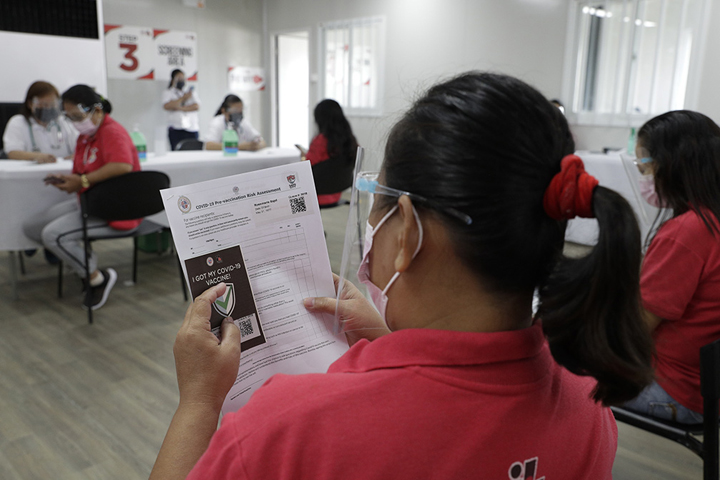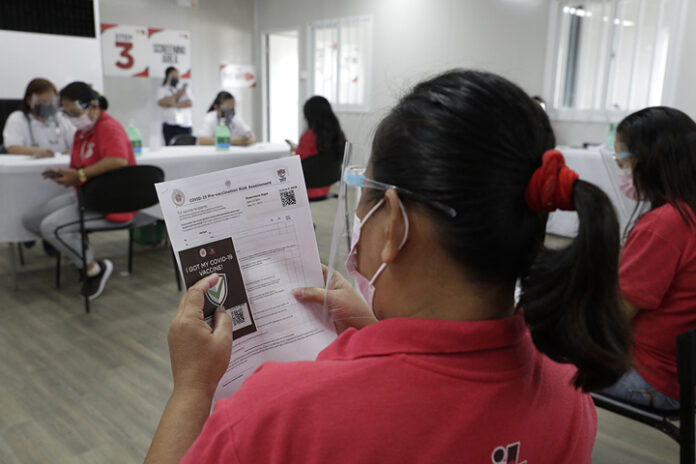THE Senate, voting 22-0, on Tuesday passed on second and third reading in one sitting the Palace-certified Covid-19 Vaccination Program Act in a determined bid to stop the spread of the deadly virus and revive the economy.
Senate President Vicente Sotto III credited Senator Juan Edgardo Angara with shepherding the multifaceted bill that had to be crafted with inputs from the national and local government, health agencies and the private sector, among others. Sotto remarked on the quick process by which such a comprehensive and complicated bill took only two weeks to be processed.

The House of Representatives, which adopted its version earlier on Monday night, immediately sought a copy of the Senate-approved bill, opening the possibility of adopting the latter in order to avoid having to convene a bicameral conference committee and thus speed up submission of an enrolled bill to the President for signing.
Angara, for his part, credited fellow senators and all resource persons and stakeholders for their inputs, saying this ensured the speedy passage.
“We have done our part,” Senate Majority Leader Miguel Zubiri said, following the quick floor vote without any hitch.
In sponsoring Senate Bill 2057, Angara was assured the awaited immunization of the population would be fast-tracked after enlisting support across the aisle with the majority and minority senators’ full backing for the vaccination program bill.
Early enactment of the enabling legislation upon its signing into law by Duterte would then facilitate the procurement of vaccines by the government, he added.
Angara said speedy approval of the measure will “remove the obstacles to the delivery of some of the first doses of Covid-19 vaccines to the country and hasten the inoculation of Filipinos across the country.”
The senator, in a statement, acknowledged that “the entire nation is eagerly waiting for the start of the vaccination program that carries with it the promise of immunization from the Covid-19 virus that has caused so much hardship and pain to all Filipinos over the past year.”
With the measure, “we hope to see the start of the inoculation of our population, starting with the priority sectors, at the shortest possible time,” Angara added, recalling that “we as a people have lost so much because of the pandemic—in terms of jobs, opportunities and human life.”
As soon as the bill is enacted into law, the national government, local government units (LGUs) and the private sector will be authorized to procure vaccines through the National Task Force Against Covid-19 (NTF) and the Department of Health (DOH), Angara said.
He confirmed that LGUs will likewise be authorized to directly procure the ancillary supplies and services necessary for the storage, transport and deployment of the vaccines.
The senator noted that a significant number of LGUs have started preparing for the rollout of their respective vaccination programs and are waiting for the enactment of the bill in order to exempt them from the legal requirements regarding the procurement of goods.
Angara said among the laws covered by the exemption are Republic Act 9184 or the Government Procurement Reform Act, Presidential Decree 1445 or the Government Auditing Code of the Philippines, and the Local Government Code.
He pointed out that the enabling law will “provide legal cover to the LGUs, many of which have intimated to us their concern about possible adverse findings by the Commission on Audit and even graft cases that may be filed against their officials.”
Angara also gave assurances that for the private sector, their procurement of vaccines will also be done in cooperation with the DOH and NTF, through a multiparty agreement.
Moreover, a National Vaccine Indemnity Fund will be established to compensate any individual inoculated through the Covid-19 vaccination program, in case of death or for the treatment of possible severe adverse effects.
The law provides a total of P500 million sourced from the Contingent Fund of the 2021 General Appropriations Act to augment the existing funds of the Philippine Health Insurance Corporation as the administrator of the indemnity fund.
“The indemnity fund will cover the indemnification agreements with vaccine manufacturers, which NTF has started fulfilling. This removes a major stumbling block to the delivery of the vaccines to the country,” Angara said.
The lawmaker listed another provision of the bill that will help bring in more Covid-19 vaccines and other critical supplies to the country: the exemption of the purchases and importations of these from taxes and duties.
The version approved on Tuesday was the product of bills filed separately by Angara and Senator Imee Marcos, aimed to exempt procurement of Covid-19 vaccines and the necessary supplies for their storage, transport and distribution from customs duties, value-added tax, excise tax, donor’s tax and other fees and charges.
In addition, vaccination cards will be issued by the DOH, LGUs and private entities to individuals who have been vaccinated. The vaccination cards will contain basic information about the individual; the manufacturer and brand of the vaccine administered; date of vaccination; date of last RT-PCR testing; and the names of the facility where the vaccine was received and the health professionals who administered the vaccine.

